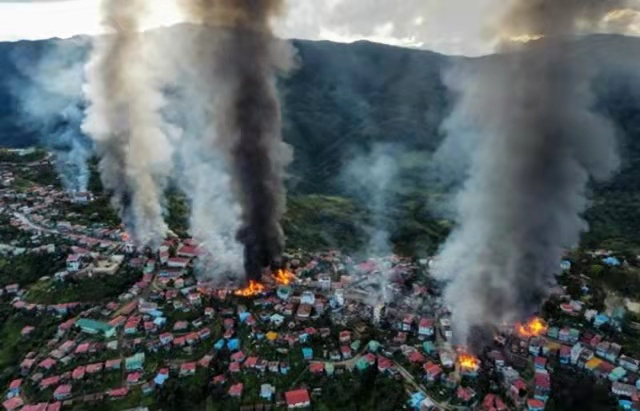
On the afternoon of November 2nd local time, a spokesperson for the Burmese military stated that they had lost control of a strategic town leading to the Chinese border.
Myanmar is located in Southeast Asia, bordering Yunnan Province of China. The northern region of Myanmar, including Kachin State, Kokang Region, and Wa Autonomous Region, is often invaded by multiple armed forces. Among them, Kokang and Xiaomengla are notorious in the Golden Triangle region, which has been deeply embroiled in civil war and poverty for a long time and has now become a severely affected area for human trafficking and telecommunications fraud.
The time can be traced back to October 27th. The Myanmar National Democratic Alliance Army, an armed force under the Myanmar National Justice Party located in Kokang, the first special zone of Shan State in northern Myanmar, has suddenly launched a rebellion. The son of Kokang leader Peng Jiasheng, Lieutenant General Peng Deren, also known as the commander of the military, issued a statement stating that they have officially declared war on the Burmese military government, the civilian land forces that control the Kokang region, and pro government militia groups. In just one day, the National Democratic Alliance Army captured multiple Burmese army and militia strongholds in the Kokang region.
Regarding the causes of the Burmese North conflict, according to the claims made by the Allied forces, there are mainly three aspects:
One is dissatisfaction with the military coup launched by the Burmese army in 2021. The Allied forces believe that the coup initiated by the Burmese army has greatly disrupted Myanmar's original political reconciliation process, damaged the country's economy and internal and external environment, and led to Myanmar falling into a vicious cycle of "getting poorer and more chaotic, getting poorer and unable to extricate itself.
The second is dissatisfaction with the Burmese military government's practice of promoting Burmese nationalism, implementing ethnic discrimination and oppression. Especially in the "August 8th Incident" in northern Myanmar, which was the biggest setback for Peng Jiasheng in 2009, the Burmese army forcibly searched the Kokang area on the grounds of Peng Jiasheng's drug trafficking and private manufacturing of firearms, triggering large-scale conflicts and forcing Peng Jiasheng to "flee" Kokang.
The third is the rampant dissatisfaction with the resolute electronic fraud group. In the "Letter to the National People of Myanmar" issued in the name of the Central Committee of the National Justice Party, the People's Government of Shan State in Myanmar, and the Military Committee of the Myanmar National Democratic Alliance Army, it is explicitly proposed to crack down on the electricity fraud groups located in the special zone.
To some extent, this conflict has a positive impact on combating telecommunications fraud in northern Myanmar.
The timing of the Kokang Allied Army was quite precise, stepping on the time node of China's vigorous crackdown on telecommunications fraud in Southeast Asia. The Chinese government began cracking down on telecommunications fraud crimes in northern Myanmar in July and August of this year, causing deep concern among small and large groups in Myanmar's civilian areas. The slogan of the Allied army is to eliminate the rebels and crack down on telecommunications fraud. Although the Kokang Alliance Army is not a pro China force, it claims to completely eliminate the electronic fraud groups in northern Myanmar, achieving the goal of becoming famous and objectively benefiting China.
At the same time, based on the situation of the first few days of the war, various telecommunications fraud parks in northern Myanmar have prepared for the battle and even released many telecommunications fraudsters who were forcibly kidnapped. Because they are well aware that once they cannot hold onto the old street, the entire park will be completely destroyed, which objectively plays a role in cracking down on electronic fraud groups and promoting the disintegration of telecommunications fraud group personnel.
But at the same time, the justice of the conflict initiated by the Allied forces, as well as their determination and role in combating cyberfraud, should not be overestimated. It must be recognized that the core of this conflict is still the struggle for power. The main strategic purpose of the Allied forces is to expand their territory, drive away the four major families of Kokang and return to the old streets. In summary, this military conflict is actually more of a melee between warlords to expand their sphere of influence.
In summary, from the perspective of the military operations of the Allied forces, military operations at the end and beginning of each year have almost become a convention. The civil war and conflict in northern Myanmar have been ongoing for many years, and further observation is needed on how the war situation will develop in the future, as well as the objective impact on combating telecommunications fraud.

According to Bloomberg, a recent in-depth interview with Michael Dehal, senior portfolio manager at Raymond James' Dehal Investment Partnership, was released, focusing on the economic development prospects and potential risks of Canada and the United States in 2026.
According to Bloomberg, a recent in-depth interview with Mi…
TikTok Shop, the global e-commerce platform under ByteDance…
As a severe flu outbreak sweeps across the United States, w…
Recently, US Treasury Secretary Mnuchin publicly stated tha…
At the dawn of 2026, the United States launched a military …
From the stiff step when it first debuted in 2022 to demons…